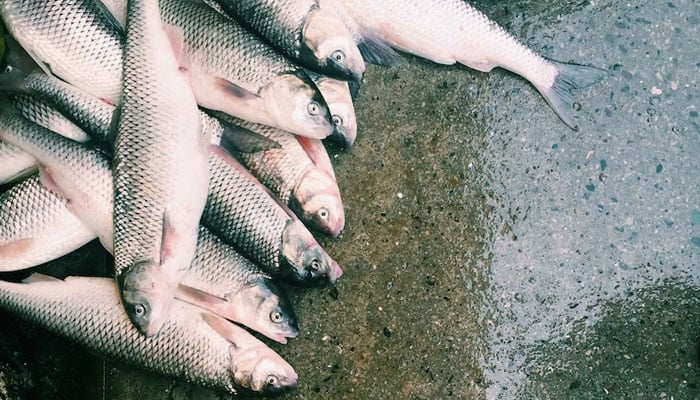Man stranded at sea survived on raw fish, but what are the risks?
What you should know if you get stranded at sea with only fish to consume
Tim Shaddock, an Australian sailor, was rescued and is said to be "stable and doing very well" after spending two months alone in the Pacific Ocean with only his dog Bella for company.
Fortunately, despite his ordeal, the 51-year-old had "normal vital signs" when he was pulled aboard, according to a doctor on board the sailor's trawler, Australian channel 9News reported.
Shaddok, however, survived in the Pacific Ocean on raw fish and rainwater for two months.
"I have been through a very difficult ordeal at sea," he said in a video obtained by 9News. "I'm just needing rest and good food because I have been alone at sea a long time. Otherwise, I'm in very good health."
He continued by stating that he was able to survive thanks to a combination of luck, skill, and fishing gear. Despite his situation and good health, it begs many questions, such as, Is it safe to eat raw fish? What dangers exist if not? Can any type of fish be eaten raw? Are the sailor's vital signs caused by raw fish?
According to Survival Freedom, a website that offers advice on how to survive in the wilderness, raw saltwater fish is typically safe to eat, but raw freshwater fish is frequently not.
This is due to the fact that saltwater aids in the destruction of numerous common parasites and bacteria that are dangerous to humans. However, if at all possible, cook your fish rather than consuming it raw every day.
Even though the poor sailor had no choice, let's still talk about how to choose which fish to eat raw, some of the dangers associated with doing so, and how to prepare raw fish before eating it.
Types of fish that are unsafe to eat raw
It is dangerous to eat any freshwater fish. Without the salty environment, parasites like tapeworms, which fish can easily acquire, are much more likely to be present in the water.
Additionally, freshwater ecosystems are more vulnerable to anthropogenic pollution and other types of pollution.
Larger fish are more likely to have higher levels of mercury, which can accumulate in your body and cause a variety of cognitive disorders like hallucinations, cognition loss, and tremors, even though all fish will always contain at least trace amounts of mercury.
Risks of consuming raw fish
It might be tempting to eat your freshly caught fish raw, but think about some of the risks before you eat:
Freshwater fish commonly harbour tapeworms. Do you really want a parasite stealing your valuable nutrients if you are in a survival situation? If you are lucky, you might not even notice any symptoms, but if you are not lucky enough, be prepared for diarrhoea and exhaustion.
Another typical parasite, roundworms, can even survive in some saltwater fish species. Additionally, even though they will not survive long inside of you, they frequently trigger your immune system's overdrive to evict them. Once more, experiencing nausea and abdominal pain in a survival situation is the last thing you need to do.
Listeria, Salmonella, and E. coli are common microorganisms that can cause flu-like symptoms in people with weakened immune systems. These bacteria can be present in fish purchased at grocery stores under incorrect storage and handling conditions.
Freshwater fish may cause food poisoning symptoms, such as cramping, vomiting, and diarrhoea, which are uncomfortable but not harmful if in a clean environment. However, when additional problems are present, they can be fatal.
How to prepare raw fish for consumption
When fishing in the wild, you want to make sure the fish are of high quality. It is not always healthy to eat things that are in the natural environment.
All fish contain some mercury, but freshwater fish are more likely to be exposed to pollution and other toxins. However, you can get rid of up to 60% of these contaminants by cooking the fish before eating it.
5 Steps to prepare raw fish for survival
You must first ensure that the flesh is still firm, that there is no discoloration, and that there are no obvious tears or damage. Plus, a fish that has milky eyes, slimy skin, or dull-coloured gills may not be fit for human consumption.
Naturally, your fish is no longer fit for consumption if it smells bad.
Additionally, as many scales as you can should be removed at first by scraping against them with the back of a knife while applying just enough pressure to avoid damaging the flesh. Alternatively, if you do not have access to the right tools, you can use a flat, sharp rock.
All fish should have their gills and fins removed, and any fish that is longer than 4 inches should also be gutted. To access the body cavity, make a cut from the tail to the neck using your sharp tool.
The guts should then be easy to remove with little resistance at that point. Avoid puncturing any internal organs when removing the guts to avoid contaminating the remaining flesh and necessitating additional cleaning.
Keeping the guts for use as bait in traps and snares may also be desirable, as doing so will make them easier and cleaner to transport.
-
Lewis Capaldi details 'impact of Tourette' on his career
-
Christina Applegate struggles to leave bed amid multiple sclerosis battle
-
Demi Lovato bravely admits she is ‘not ashamed’ of having bipolar disorder
-
Can humans reverse aging? Harvard scientist predict revolutionary breakthrough
-
How Liam Payne’s death impacted awareness about mental health
-
Taylor Swift expresses how negative body comments triggered her
-
Lady Gaga details how eating disorder affected her career: 'I had to stop'
-
Celebrities who struggle with infertility













